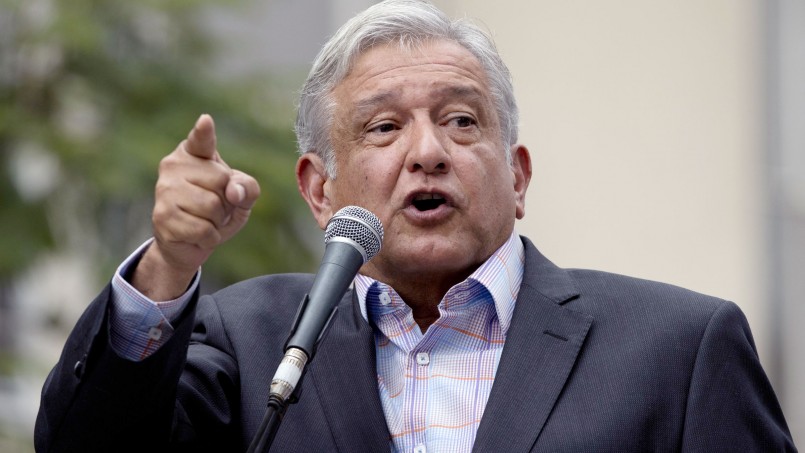Mexico’s 2018 presidential election is already stoking concern north of the border. For months, populist candidate Andres Manuel Lopez Obrador has led the polls for what promises to be a close presidential race. As a result, public and private sector officials in the United States have begun voicing their unease with the possibility of a sharp turn to the left in Mexico’s security and economic policies if Lopez Obrador wins the vote. According to an April 10 report, for example, banking and investment leaders last week pressed Lopez Obrador to publicly present his economic policies to ensure that his presidency would not echo that of late Venezuelan leader Hugo Chavez. And during an April 5 congressional hearing on homeland security, U.S. Homeland Security Secretary Gen. John Kelly and Sen. John McCain both characterized a potential Lopez Obrador win as a negative outcome for the United States and Mexico.
Regardless of the outcome of next year’s election, Lopez Obrador appears destined to leave a populist mark on the Mexican political landscape. But if elected, his vision for the country will be checked by a deeply divided political system, entrenched bureaucratic obstacles and a powerful business elite, fundamentally constraining his impact on cross-border relations.
Mexico’s elections have typically been routine affairs. The ruling Institutional Revolutionary Party (PRI), which historically has dominated Mexican politics at the national and local levels, has been in political decline for nearly three decades, but it retains substantial support across the country. And even when it lost the presidency in 2000, it did so to the more conservative National Action Party (PAN), which continued the process of deeply integrating the U.S. and Mexican economies that began in earnest with the implementation of NAFTA in 1993 under then-President Carlos Salinas de Gortari.
Lopez Obrador ran as a highly competitive candidate in 2006 and 2012 using the party machinery of the leftist Party of the Democratic Revolution. This time, he is running his own party, the National Regeneration Movement (Morena), and the PRI’s decline on the national level has substantially improved his odds of winning. His political fortunes have been further boosted by Donald Trump’s rhetoric targeting Mexico during the 2016 presidential campaign. Polls suggest that Morena is now clearly competitive with the PRI and the PAN.
It is easy to understand the sources of Washington’s vague unease with Lopez Obrador. For decades, Mexico has been a key trading partner of the United States and has closely cooperated with U.S. law enforcement in targeting transnational criminal organizations. The deep economic ties sown by NAFTA, along with the centrality of Mexican armed forces and police to the U.S. counternarcotics strategy, give Washington a vested interest in whether the next Mexican administration generally stays the bilateral course. North of the border, the main concerns are that Lopez Obrador could worsen Mexico’s benign business environment (in particular, by pulling back on the country’s landmark energy reform), upend public finances by raising spending and severely disrupt security cooperation with Washington.
It is no exaggeration to say that Lopez Obrador would indeed be Mexico’s most left-of-center president in decades. This early in the campaign season, there is little clarity about what policies Lopez Obrador would try to enact first as president. But after taking office in December 2018, he would be expected to enact at least some of his populist agenda to cement his political base of support. Inevitably, his rise to the presidency would be accompanied by breathless media speculation about how his government will be a radical departure from previous governments.
Grappling With the Establishment
The potential impact, however, of a Lopez Obrador presidency on U.S. economic and security interests in Mexico has likely been overstated. In part, this is because Lopez Obrador would have to work within Mexico’s bureaucratic structure, a byzantine political system that has historically tamed the bold presidential ambitions laid out at the outset of each six-year term. Some friction with the United States can be expected, but the constraints of Mexico’s system tend to bend policies toward the status quo. The structure of the bureaucracy, and the political factions that have developed within this system, will work to shape the president’s policies to fit their own interests. And where the incoming president’s demands clash with the established order, it will attempt to block him.
Moreover, Lopez Obrador would need to acquiesce to Congress to access the funding needed to implement even a nominal populist agenda. His success here will depend on the makeup of Congress after the 2018 federal elections, when Mexicans will vote on all 128 senators and all 500 lower house legislators concurrently. Given the deep divisions in Mexico’s domestic politics, it will be difficult for Morena or its allies to secure a majority in either house. Consequently, attempts to substantially raise public spending or defund services favored by the country’s other political parties would run into significant resistance.
The new president would also have to reckon with the power of Mexico’s private sector, which is deeply intertwined with the country’s political system. Private sector elites see foreign direct investment as crucial to the nation’s well-being (not to mention their own fortunes), and their interests tend to be deeply dependent on ties with the U.S. economy.
Lopez Obrador would face similar constraints in changing Mexico’s security policy. As a candidate, he has sharply criticized the use of the Mexican armed forces as a substitute for the police in areas of high drug cartel activity. But statements suggesting that he would pull the military out of police duties would be credible only if he had a viable alternative. At this point, he doesn’t. In hot spots such as Michoacan, Guerrero, Tamaulipas and Veracruz states, local police forces have been unable to meaningfully challenge criminal organizations. Creating a new police force from scratch would be difficult and time-consuming, and it could eventually run into the same corruption problems plaguing the forces it replaced. No president could afford the erosion of public security — and subsequent political backlash — that would likely ensue if the military were withdrawn. Moreover, any efforts to reduce the military’s presence or alter the nature of intelligence sharing with the United States would sharply worsen diplomatic ties with Washington.
The abundance of constraints facing Lopez Obrador does not mean that his presidency is fated to perpetuate the status quo in all areas. His administration could change how some of the country’s federal ministries and agencies function simply by issuing presidential decrees — not unlike Trump’s use of executive orders — to implement some changes opposed by Congress. Though Lopez Obrador cannot, for example, undo the constitutional changes underpinning the recent energy reform without broad congressional support, he could issue presidential directives that slow offshore oil and natural gas concessions. Nonetheless, major changes would require congressional approval and risk provoking a potentially damaging conflict with the country’s political elites and institutions.





